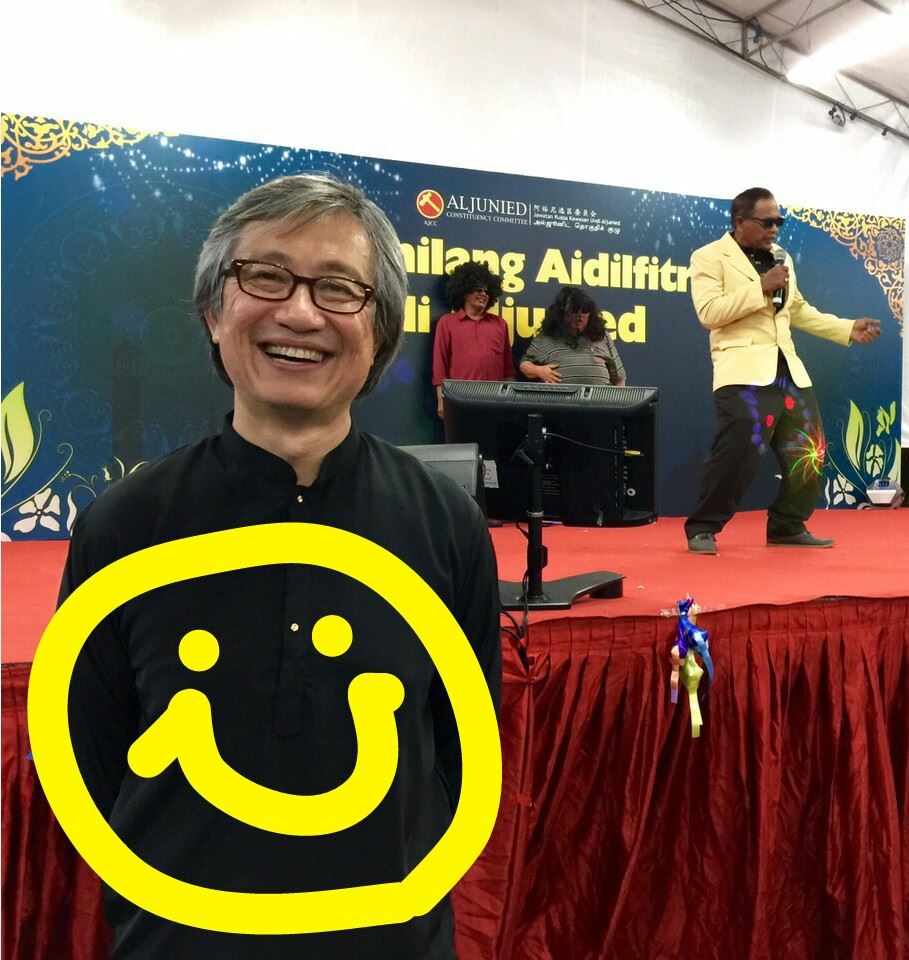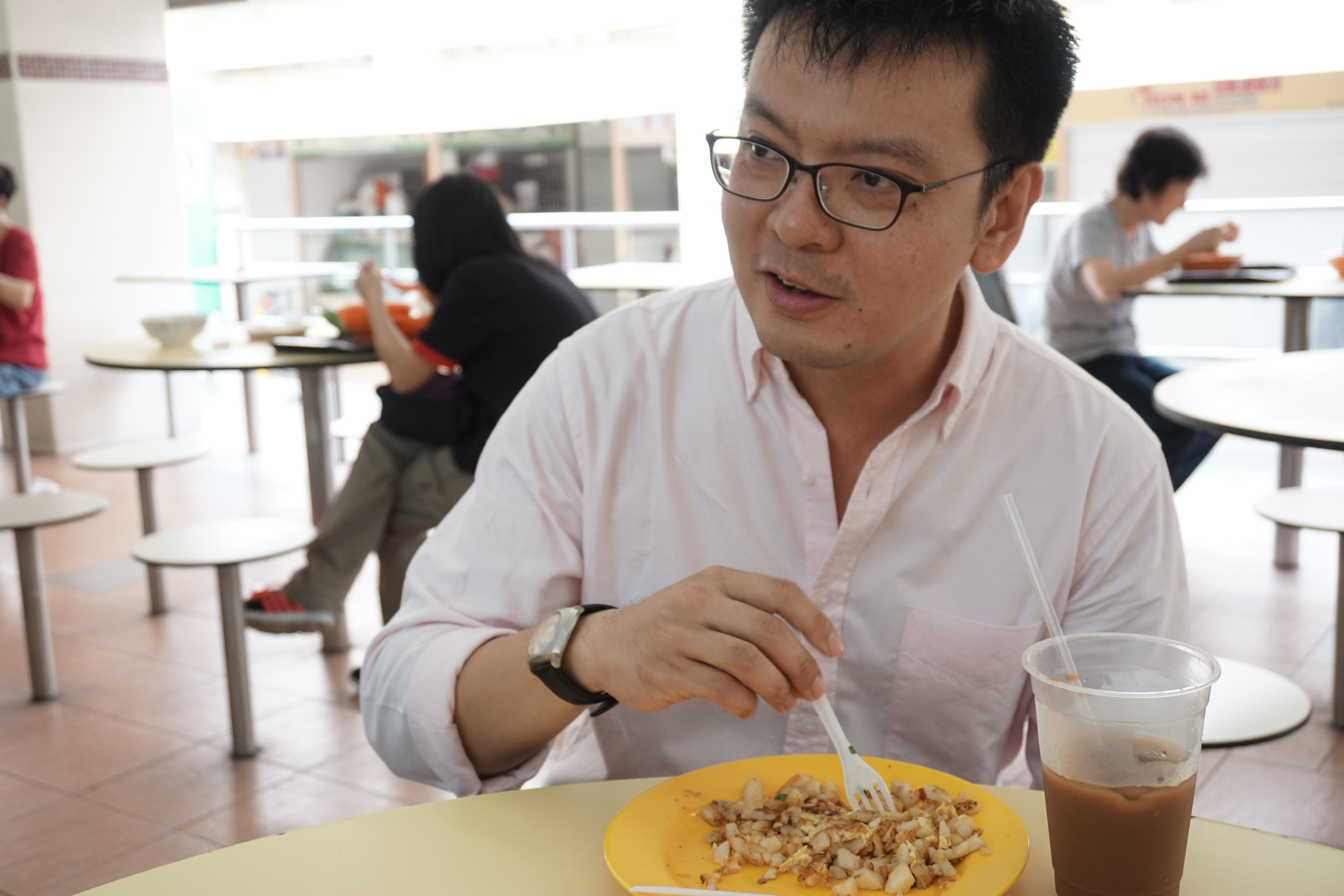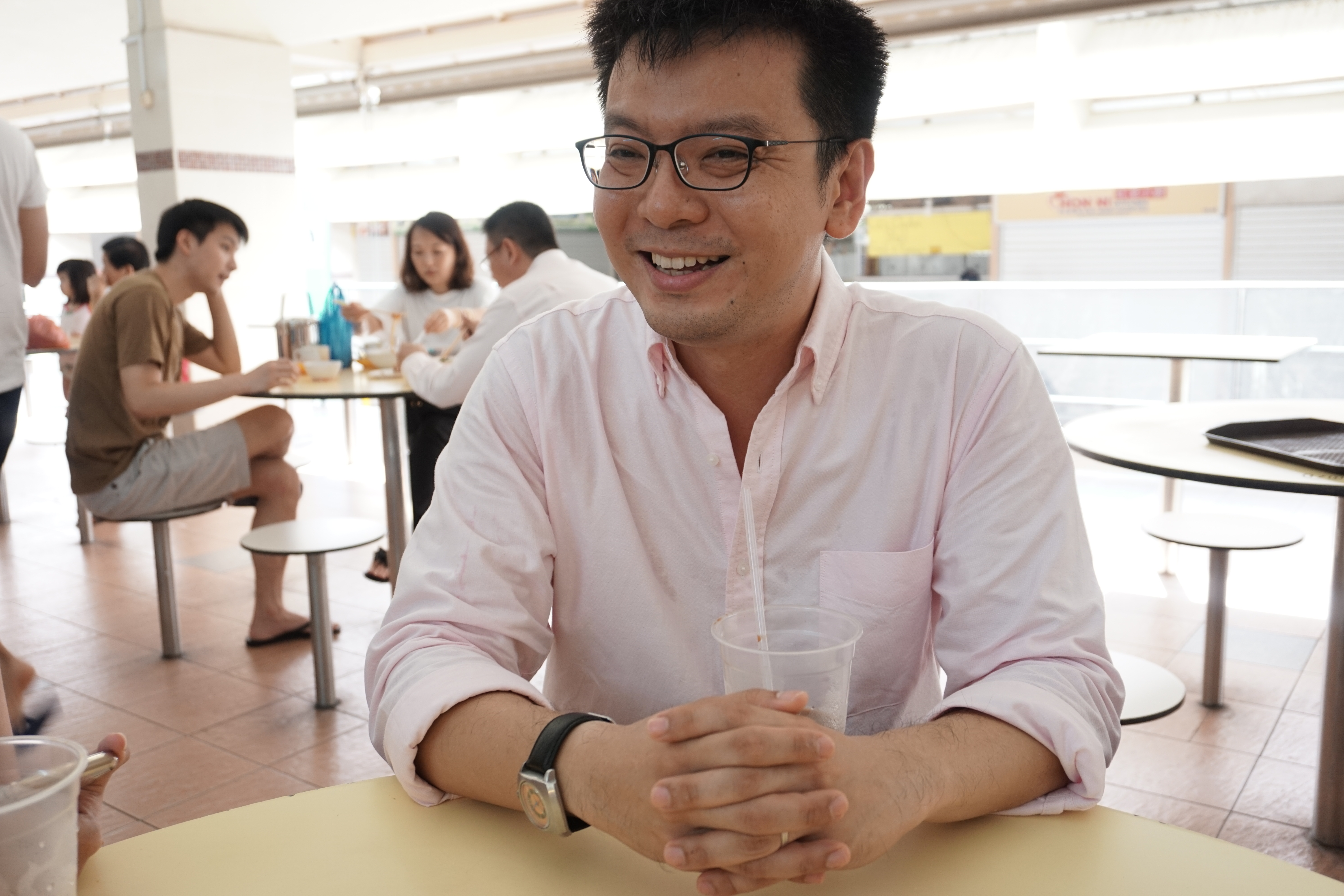One of the first Workers' Party (WP) potential candidates we wanted to meet was 42-year old Sociology Associate Professor Daniel Goh from the National University of Singapore (NUS).
Before WP chairwoman Sylvia Lim created her Instagram account last week (Aug. 12), many would read Goh's Facebook page for a different interpretation of WP's official stand on issues.
For example, it was Goh who shed light on Lim's first post about eating fried oyster after Deputy prime minister (DPM) Teo Chee Hean read too much significance into it.
This'>
Posted by Daniel Goh 吴佩松 on Friday, August 14, 2015
Goh, married with a child, first entered the public's imagination during his maiden rally speech for Punggol East MP Lee Li Lian in the 2013 by-election:
" width="760" height="428" frameborder="0" allowfullscreen="allowfullscreen">
There aren't many academics in Singapore who dare to dabble in opposition politics (notable ones include the Singapore Democratic Party's Chee Soon Juan and the NUS medical school's Prof Paul Tambyah), but Goh does it with confidence (it also helps that he's already gotten tenure).
Anyway, the Mothership.sg team met Goh earlier this week for breakfast at Blk 216 Bedok North Street 1 Hawker centre because he likes the "better and cheaper" food there. And in case you are wondering, this breakfast venue is located within East Coast GRC.
Below are 5 fascinating stories Goh revealed during our breakfast:
1. His political awakening
"I've been a supporter of the Workers' Party since 1988, because the late 80s was a period of my political awakening due to several events happening in the region — in South Korea, the Philippines, and also what was happening here in Singapore with regard to the Marxist Conspiracy arrests and the Catholic Church getting involved and everything. I'm a Catholic, so I was very... those were my teenage years. I was just 14, 15 years old. It was more like, just when my consciousness of the world began to expand, these things happened at the same time, so there's a kind of coincidence there. So it became my moment of political awakening, you know — South Korea, Philippines, Marxist Conspiracy arrests and then Tiananmen, and everything.
It brought a lot of questions, and that's when I started exploring, ok what are the political parties in Singapore, what is the democratic process like, so on and so forth, and I started going to rallies, PAP rallies, WP rallies, and I went to the Eunos rally in 1988 and I was impressed because the kind of issues that they were championing were the kind of issues that spoke to me, and ever since then I've kind of tracked WP, and been a close supporter in terms of alignment of ideas and platforms, the policy platforms they have".
2. How he ended up entering politics and called it part of "national service":
"The thing about my whole involvement in politics is that I have no aspiration per se of becoming a politician because that was... I think this is something that's quite strange in Singapore, in any case, right, to want to become a politician. It's not quite in the cultural worldview of Singaporeans, so to speak. So it came through a series of coincidences.
In 2011 again I went for the rally and a friend called me up and asked me 'so do you want to help out with the WP? We need help in the backroom, to do research, to do various things for the different candidates' and I said okay, yeah, why not, for me I treated that as a calling to national service, to advance the democratic process as much as possible to contribute as a citizen, basically. So that's when I started volunteering in 2011. Then further coincidences happened in a sense that they're not really coincidences, maybe a better word to use is serendipity. And WP won Aljunied, they had to go into Parliament, and they needed more support in terms of research and whatnot, and again it was a call to National Service.
(They said) 'You know, Daniel, you're a sociologist, you can help us with policy analysis, please stay behind, help us with policy work,' and I said yeah okay. This is national service, right — it's to improve policy, it's to improve WP's work in parliament and whatnot, so that's what I did. So I did that, and helped out at Show Mao's MPS just to also be grounded, because I believe that one cannot just do policy analysis, kind of armchair style — one has to go down and not just go down but actually be with the people on the ground and to understand their concerns so that's what I did."
3. His first experience at a Meet-the-People Session with WP MP Chen Show Mao
"The very first MPS was a bit of a religious experience, so to speak? There was a certain sense of 'oh wow, we've won Aljunied'; there was a half-disbelief that we're there during MPS and the residents, too, seemed to feel that way. And a lot of them were coming down just to see what was going on and to have a mini-rally, all of them trying to take photos with Show Mao or whatever. And all the volunteers were just trying to scramble to differentiate those with real problems and who need the MP's help, and those who just wanted to take photos. And we had to kind of space it out because we didn't want to disappoint anyone... So that was a very interesting experience!
You don't really see this in Singapore, this kind of 'outpouring'. In sociology, we have the term "effervescence", a kind of bubbling-up of social emotions where suddenly people feel like they're no longer alone as individuals trying to deal with whatever problems they have, but feel like they are part of a collective; they feel that there is something called society. So everybody at the void deck at that point, they felt there was a 'collective'.
It cuts both ways because with that kind of energy starting out, it could also really crash after that. And then a lot of volunteers will get disappointed because they can't sustain the energy, and they were there in the first place to feel good, and if they don't feel good, they leave. This could be a problem.
But fortunately, or due to the wisdom of the volunteers together with Show Mao, we were very grounded. From the very beginning, we knew this would happen. So what we did was we want to make sure we channel the energy as much as possible to making processes so that the MPS will be institutionalised — people know their role, they know why they're doing what they're doing, the meanings that are attached to the roles, the jobs they have so that it's not just about feel-good anymore, it's more about the kind of meanings that are sustained weekly. And they come because after each MPS, it's not the high — it's the fact that they bring home the satisfaction that they have done something good, and they have served."
(By the way, we asked him what he thought about criticism that Chen has been a disappointment in Parliament, after how promising he seemed throughout the 2011 hustings. To this, he said Chen perhaps did not speak up as much on things that mattered to younger Singaporeans, but worked hard in championing the cause of the elderly, and promoting greater assistance to them, throughout his parliamentary airtime.)
4. Defining characteristics of key WP figures he's worked with
- Low Thia Khiang: Goh's guardian angel and "Orh Cheh" (Blue black bruise)

"The image that comes to my mind is of him (when you mention an idea that can be raised in parliament) he will suddenly straighten his back and go 'No no no no no, orh cheh, cannot'. that means it's not rational, it's not responsible. It's not something that the WP should be raising in parliament because we will be acting irresponsibly, not opposing for opposing's sake. so that's the image I get. and it's a very good image because it's almost like he's acting like my guardian angel. Whenever I think about him, that's his classic reaction."
- Sylvia Lim: "The resident joker"
 Photo by Jeanette Tan
Photo by Jeanette Tan
"It's her boisterous laughter and sense of humour. Like during CEC meetings, when there's a discussion about something, she sees the humour in the situation and crack a joke and start laughing, and everyone will start laughing because her laughter is so infectious. So she will lighten the mood, and then we will again discuss. Sometimes things get a bit heated, but she's able to calm everyone down by just laughing and cracking a joke about it."
- Chen Show Mao: "The disarming charmer"
 Source: Chen Show Mao's Facebook page
Source: Chen Show Mao's Facebook page
"It's his disarming charm, in a sense — let's say if a resident comes to him at MPS with an issue and he's so angry from it all — he may not be angry at Show Mao or the Workers' Party, or the town council, but he's so angry at the whole situation, the situation that he's caught in, and he's just kind of taking it out on the government, the town council, on everything, and taking it out on Show Mao. It's his disarming charm of trying to calm people down, talking slowly, and getting them to calm down so that the problems can be solved again in a very rational manner without getting too emotional. He's very clear about it. But what is interesting and very human about this is he charms them in a very disarming way.
There was one time I actually saw him just walking away to be by himself, and he was just calming himself too. So he was affected by the situation too — very affected, in fact, he was shaking a bit. But he was calming himself down, saying things to himself, and then he just switches, he goes back, brings his disarming charm again to the rest of us. So I really respect him for that because this is something that, a skill that a lot of politicians really need to have on the ground, especially with dealing with very angry residents. To be able to calm them, to talk nicely, and just take in all the emotions, just take it in, then go to the side and just somehow process it then come back. So that's one thing I really remember."
- Lee Li Lian: "The sisterly warmth"

"For Li Lian, it's during house visits, when I follow her on house visits, the kind of warmth she brings. She'll go knock on the door and she'll just, as though she's found a long-lost friend/sister and just talks to the residents, the residents themselves will feel the warmth immediately."
5. How his experience of the 1987 Marxist Conspiracy impacted him
"I actually don't feel positive or negative about it because this was during my formative period (he was in his early teens at the time). But what really woke me up was the kind of emotions that came up from the people I saw — the hurt that some people harboured after that, of seeing the whole process and the kind of discomfort that other people had, the fact that the Church tried to take a stand at the beginning with regard to the issue. So for me it was a bit removed.
In fact Tiananmen affected me more than the Marxist Conspiracy, in a sense that because Marxist Conspiracy happened first and I was kind of detached, I was a very young 13-year-old, just completely shocked by this sudden outpouring of emotions and debate that's happening among the Catholics. And for me, seeing my parents arguing and thinking, 'What's happening?', so it sparked in me curiosity more than anything else. But with Tiananmen it was after two or three years down the road so that affected me more — you know, 'how can a government do this to their own citizens?' so on and so forth."
A final question for Goh: What local hawker dish are you most like, and why?
 Photo by Jonathan Lim
Photo by Jonathan Lim
You might be able to guess his answer from the picture: Chai tau kway (Fried carrot cake)
"Mainly because I grew up with it, so it reminds me of the love of my parents, the consistency in the sense that I can expect it on my table, in the brown envelope (it has to be in a brown envelope for nostalgia's sake, right?) on Saturday morning, and then eating it is a kind of comfort food... and then after that playing with my sister, having the whole weekend, hanging out with my parents, going to church and going out to Botanic Gardens to play.
So it will signify to me the kind of ideal Singapore for me, in which families will have time off, will have a balance between work and life, and they are able to enjoy their weekends and their time off with each other and they have spaces to run to like the Botanic Gardens, the parks... it's the kind of work-life balance that seems to be lost these days, so that's kind of what it represents to me.
(My favourite type) used to be black then at some point I switched to white because it became a bit too sweet for me. White has more egg. Black is sweeter so it kind of switched as I grew older. And it must be a bit wet, this is a bit dry. Must have chilli and must have a lot of cai poh because I'm Teochew."
All photos by Jonathan Lim.
If you like what you read, follow us on Facebook and Twitter to get the latest updates.
